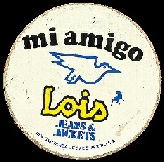© 2014-


Radio Mi Amigo - History (4)
Reception of Radio Mi Amigo in its target area of Belgium and the Netherlands continued to be unsatisfactory and prone to interference, so with pressure from the station's own ers the Caroline organisation decided in July 1977 to introduce yet more changes in an attempt to improve the signal. Radio Mi Amigo’s programmes moved to a new wavelength, 212m on 25th July 1977.
ers the Caroline organisation decided in July 1977 to introduce yet more changes in an attempt to improve the signal. Radio Mi Amigo’s programmes moved to a new wavelength, 212m on 25th July 1977.
Frequent breaks in transmission occurred during September, October and November 1977 and major problems with the generator ultimately resulted in a ten day silence of both stations on the MV Mi Amigo in November. However, both stations returned to the air on 21st November 1977, although there were a number of other minor breakdowns caused by the faulty generator.
Radio Mi Amigo was also experiencing other problems at this time -
After being detained in Zeebrugge the Hosanna was towed to Brugge where she was chained up in the harbour because the authorities alleged her documentation was not in order. In October 1977 another trawler owned by the same shipping company, Vita Nova, was also chained up by police on suspicion of being used to tender the Mi Amigo.
Further changes in the broadcasting arrangements for both stations on board the Mi Amigo took place on 1st December 1977. Although Radio Mi Amigo had use of the 50Kw transmitter tuned to 212m reception was still poor in Belgium and the Netherlands, while Radio Caroline on 319m with only 10Kw of power had a much better signal. Therefore it was decided to swap transmitters and wavelengths and Radio Mi Amigo was re-
During December 1977 press reports appeared in Holland saying that four DJs had left Radio Mi Amigo very suddenly -
1978
Towards the end of July and the beginning of August 1978 rumours started to appear about the future of Radio Mi Amigo. A generator breakdown (not an uncommon occurrence anyway) had put Radio Mi Amigo and Radio Caroline off the air for three days in July and rumours began to spread that both stations had closed for good. When Radio Caroline did eventually return to the air an announcement by Radio Mi Amigo DJs was carried during its programmes denying the rumours.
At the beginning of August stories also appeared in the Belgian and Dutch press saying there were various proposals for Radio Mi Amigo to be sold to another individual or organisation. Sylvain Tack denied all these rumours and, despite the confusion, the station did continue broadcasting with a mixture of live and taped programmes.
Behind the sc enes though Radio Mi Amigo did have some real problems. One of the main difficulties in operating the station were the distances between Spain (where most programmes were pre-
enes though Radio Mi Amigo did have some real problems. One of the main difficulties in operating the station were the distances between Spain (where most programmes were pre-
During September 1978 Belgian police mounted a series of operations against people thought to be involved with Radio Mi Amigo and although no arrests were made it demonstrated that the authorities knew who was connected with or involved in the operation of the station and led to a general feeling of unease and uncertainty amongst those concerned.
On 20th October 1978 Marc Jacobs interrupted the programmes and said that Radio Mi Amigo must leave the air due to a generator fault. Radio Caroline and Radio Mi Amigo then went off air abruptly at 11.54am. At the end of October 1978 Sylvain Tack announced Radio Mi Amigo would continue as a legal operation in Spain providing a daily programme for tourists. The first of these programmes was actually broadcast over a network of five Spanish local FM stations on 23rd October 1978 (three days after the offshore station had closed so suddenly) and the intention was to increase the output to a daily three hour slot from 1st January 1979.
1979
Fuel supplies on the Mi Amigo were so low by mid-
The launch of this new Dutch language service finally confirmed to listeners the rumours which had been circulating for some months that Radio Mi Amigo had broken its ties with the Radio Caroline organisation and the MV Mi Amigo.


Click on picture to enlarge
Promo for Radio Mi Amigo International

Part of Radio Mi Amigo’s final programme 20th October 1978, Ton Schipper


History
Key Dates
Ship and Location
Technical
Staff
Programmes





Treasure Chest





Back to Britain Gallery


Back to Netherlands/Belgium Gallery


Back to Radio Mi Amigo
